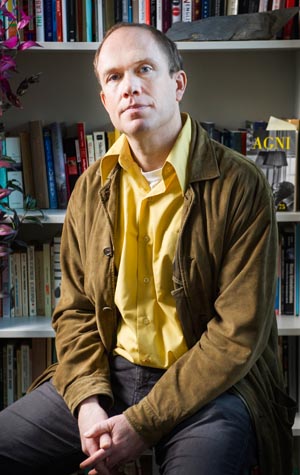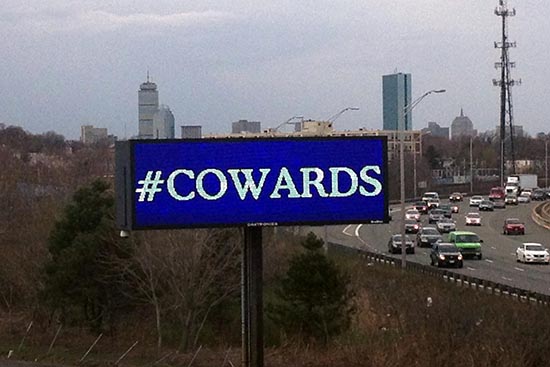Book Asks: Are Terrorists Cowards?
BU assistant professor Chris Walsh breaks ground with Cowardice: A Brief History

What is a coward? Many Americans called the 9/11 hijackers and the Boston Marathon bombers cowards, with no clearer proof than the photo accompanying this story of a labor union’s sign after the Boston attack. Chris Walsh, an assistant professor at Boston University’s College of Arts & Sciences (CAS), disagrees, and he can claim considerable credibility: he’s written what he says is the first scholarly book on pusillanimity. Walsh’s book argues that the misuse of “coward” has caused enormous harm throughout history. But properly understood, Walsh says, the word and the idea behind it are essential to promoting ethical behavior.
Cowardice: A Brief History, published by Princeton University Press, is Walsh’s “first and last” book, he says, referring to his volume’s prolonged gestation (it began as his PhD dissertation at BU). Walsh (GRS’00) now directs the CAS Writing Program and is an assistant professor of English.
With no previous academic foragers in this field, his research plumbed diverse disciplines and sources. These included fiction such as Dante’s Inferno, which consigned to hell those souls too cowardly to live life fully, and Stephen Crane’s Civil War novel, The Red Badge of Courage. Nonfiction informed him, too—in particular The Execution of Private Slovik, a 1954 account of the titular World War II soldier who was the last American executed for desertion.
BU Today spoke with Walsh about his exploration of the use—and misuse—of the problematic word.
BU Today: How did you go about researching as unwieldy a topic as cowardice?
Walsh: I did it in an unwieldy way. It was my dissertation back in the ’90s. I abandoned it for five years and went back to it [in 2005]. The dissertation was what one of my friends called “intellectually diapered,” looking at a selection of American fiction and asking, what does it tell us about cowardice? I decided if it were to be a book, it would have to look into history and become more philosophically informed and informed by psychology.
I focused it [by] concentrating on the military context on the battlefield. I argued that the archetypal home for the coward was the military. I did tons of Google searches, but I started this before Google existed. There were books that were models, especially a book called The Mystery of Courage [by William Ian Miller].

Why does this topic matter?
The fear of cowardice has led to wars and all sorts of violence—the fear of being [cowardly] or the fear of being branded it. LBJ was having dreams about being called a coward and did say, “if I left that [Vietnam] war, I would be considered a coward and my country would be considered cowardly, and nobody would trust anything we do again.”
The American history of cowardice starts in the French and Indian War with a preacher saying, “These French and Indians are killing our countrymen, and you people in Virginia are too cowardly to do anything about it.” His sermon, “The Curse of Cowardice,” got a bunch of people to join a company, and they marched on Fort Duquesne [in modern Pittsburgh] and the French scurried. But the British authorities did not think much of the colonial soldiers and thought them cowardly come the 1770s, when the colonists start to rebel.
You write that people misuse the word “coward.”
You’ve got that hashtag COWARDS from the Boston Marathon bombing, and the word was thrown around after the 9/11 attacks about the perpetrators. It’s understandable; it was used because, without uttering an obscenity, we could lash out as harshly as possible. But I give a definition of cowardice, drawing on Aristotle and the Uniform Code of Military Justice today: the failure of duty because of excessive fear. That means it’s hard to see how the 9/11 perpetrators were cowards. They may have been guilty of what I call the “cowardice of their convictions,” where they wouldn’t recognize things that [might] change their views, because they were afraid of new ideas, of tentativeness, of not acting. But I don’t think that’s the way most people used it. The problem with using it that way is it makes it seem something villainous and spectacular, and therefore cowardice has nothing to do with us, and it’s not something that needs to inform our own ethical decision making.
That military code [definition] offers a clear message. Much of the book is about how the term has become less applicable to war, because we know more about human psychology, and we rightly attribute failures in battle to things like post-traumatic stress disorder. The world would be a better place if some people worried less about being cowardly. If only LBJ was not worried about being cowardly.
A version of this story was originally published in BU Research.
Comments & Discussion
Boston University moderates comments to facilitate an informed, substantive, civil conversation. Abusive, profane, self-promotional, misleading, incoherent or off-topic comments will be rejected. Moderators are staffed during regular business hours (EST) and can only accept comments written in English. Statistics or facts must include a citation or a link to the citation.